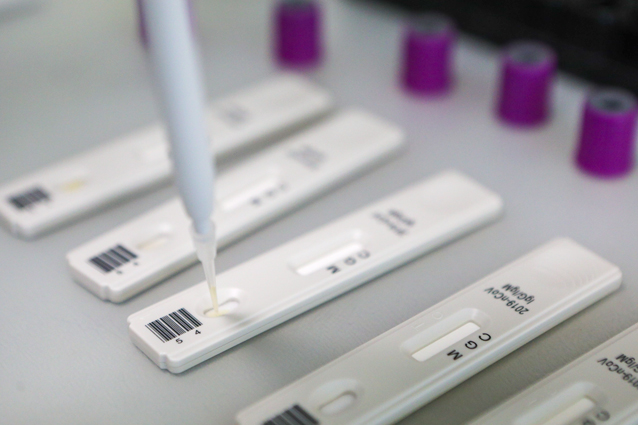The most effective COVID-19 tests
06/21/2021

Russia has recorded yet another increase in COVID-19 infection. The pandemic has shown that timely testing helps to contain the spread of infection. However, existing rapid tests have serious drawbacks, chief among which is a high percentage of false results. We assess common flaws among testing systems and find out if manufacturers have successfully eliminate them
SARS-COV-2 antigen tests
Antigen tests detect the presence of virus proteins in the blood. Their advantages include rapid results (within 5-15 minutes) and their ease of use. The main disadvantages are their unproven accuracy among newly infected people and, generally speaking, lower sensitivity compared to PCR tests (approximately 85-97.6%). Since 2021, legislation has considered antigen tests to have equal validity with PCR test results.
One of the most popular rapid antigen tests is BIOCREDIT COVID-19 Ag, made in South Korea. It is used to discover the antigen in people with clinical symptoms of respiratory infections and who may have contracted COVID-19.
The sensitivity of BIOCREDIT COVID-19 is in no way inferior to PCR testing. Clinical and laboratory tests have shown the test to have a sensitivity of 96%, with 100% diagnostic precision.
The mechanism is simple: after taking a smear, the sample is placed in a test system on a membrane strip coated with COVID-19 antigens. If a virus is present on the T line, a black stripe will appear. Results are available within 5-8 minutes.
The SGTi-flex COVID-19 Ag is also notable for its high precision and ease of use. Its sensitivity to viral proteins is 96%, with 100% diagnostic precision. False results from the SGTi-flex COVID-19 Ag test are extremely rare.
Another Korean test widely available on the pharmaceutical market is NowCheck COVID-19 Ag. Compared to the previous options, it has slightly lower sensitivity (89%) and precision (97%). It works similarly, and typically yields results within 15 minutes.
IgM and IgG antibody tests for COVID-19
Antibody tests detect immunoglobulins in the body responsible for fighting the virus. This method establishes whether a person has been in contact with a sick person and accurately identifies hidden carriers or those who have successfully defeated an infection.
One of the best rapid tests is the Korean-made careUS COVID-19 IgM/IgG: it immediately detects two types of antibodies and helps both confirm diagnoses and identify those who are no longer infected. In addition, it is easy to use. If SARS-CoV-2 antibodies are detected, blood drops bind to gold nanoparticles and the test displays purple stripes. The test has shown 93.6% sensitivity and 98% diagnostic precision, with results available in 10 minutes.
The Russian Rapid Bio COVID-19 IgG/IgM test has also proved its worth. It is more sensitive than the previous system, achieving results of 96%, with 99% precision. However, the results may take longer to appear, between 10 and 20 minutes from the moment of testing. In addition, the test requires more biomaterial: 20 mcl of blood, as opposed to 10 mcl.
Another test, the Korean SGTi-flex COVID-19 IgM/IgG, achieved lower results than its competitors: 94% sensitivity and 97% precision. Still, it is just as easy to use.
RBD tests
RBD tests detect antibodies to the coronavirus S-protein, especially in its receptor-binding domain (RBD), which directly determines immunity to infection. These tests are administered before vaccination to identify the presence of antibodies and assess the need for vaccination.
RBD tests can also detect the presence of antibodies post-vaccination. Unlike most other rapid antibody tests on the market, which are designed to detect antibodies to a live virus, this diagnostic method can detect post-vaccination antibodies as well. Even when previous-generation antibody tests might not detect the immunoglobulins in question, this system will yield an accurate result.
Among the most reliable tests is the Korean SGTi-flex-19 IgG. It achieved 92.4% sensitivity and 99.15% precision in testing
10 mcl of biomaterial (whole venous blood, plasma or serum) are added to a special well on the surface of a test cassette. Three drops of buffer solution are then added to the blood. If the result is positive, purple stripes will appear near the test line. Results are available in 10 minutes.
A Russian test noted for its high precision is Express-VAC SARS-CoV-2-IKhA, the first and only domestic rapid antibody test. It boasts 95% sensitivity and precision. Its reagents have been tested on several vaccines, including Sputnik V. The package includes an antiseptic towelette, a sterile lancet and a pipette for the biomaterial. The mechanism is identical to the Korean test, except that any color stripe indicates a positive result. Results are also available within 10.
How often should patients test for COVID-19?
A second test should always be taken, regardless of the screening method initially used, as any testing system can return a false negative or false positive result. If symptoms arise after the first negative result, a second test should not be immediately administered. A testing interval of one day or more is required to allow antibodies to form. If no symptoms are observed, a repeat test should be conducted after 10-11 days. This is especially important for those suffering from a suspected infection and waiting for a negative result. After receiving a negative result from a second test, you can rest assured: you’re healthy!
Загрузить ещё